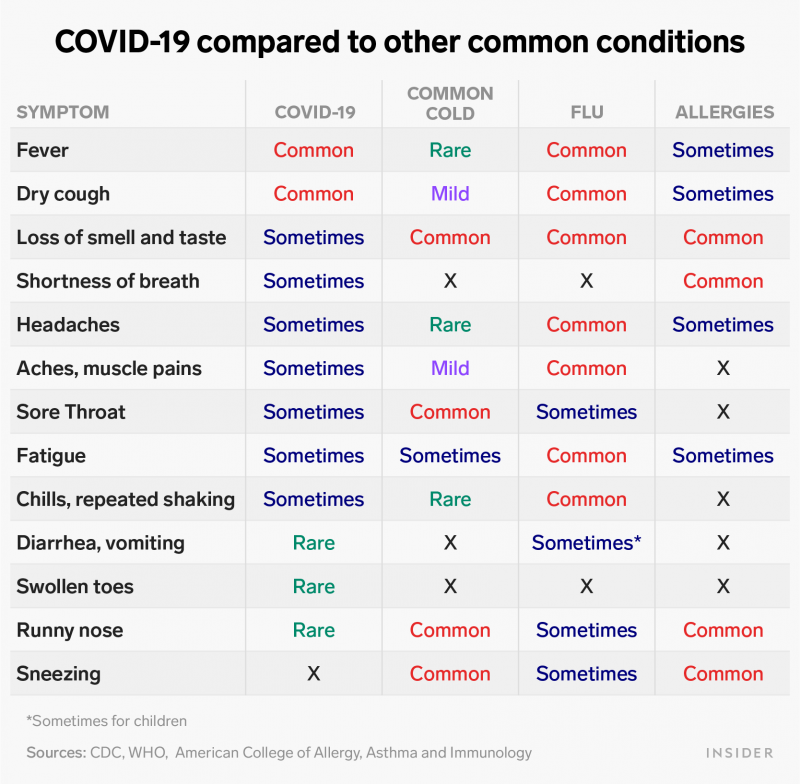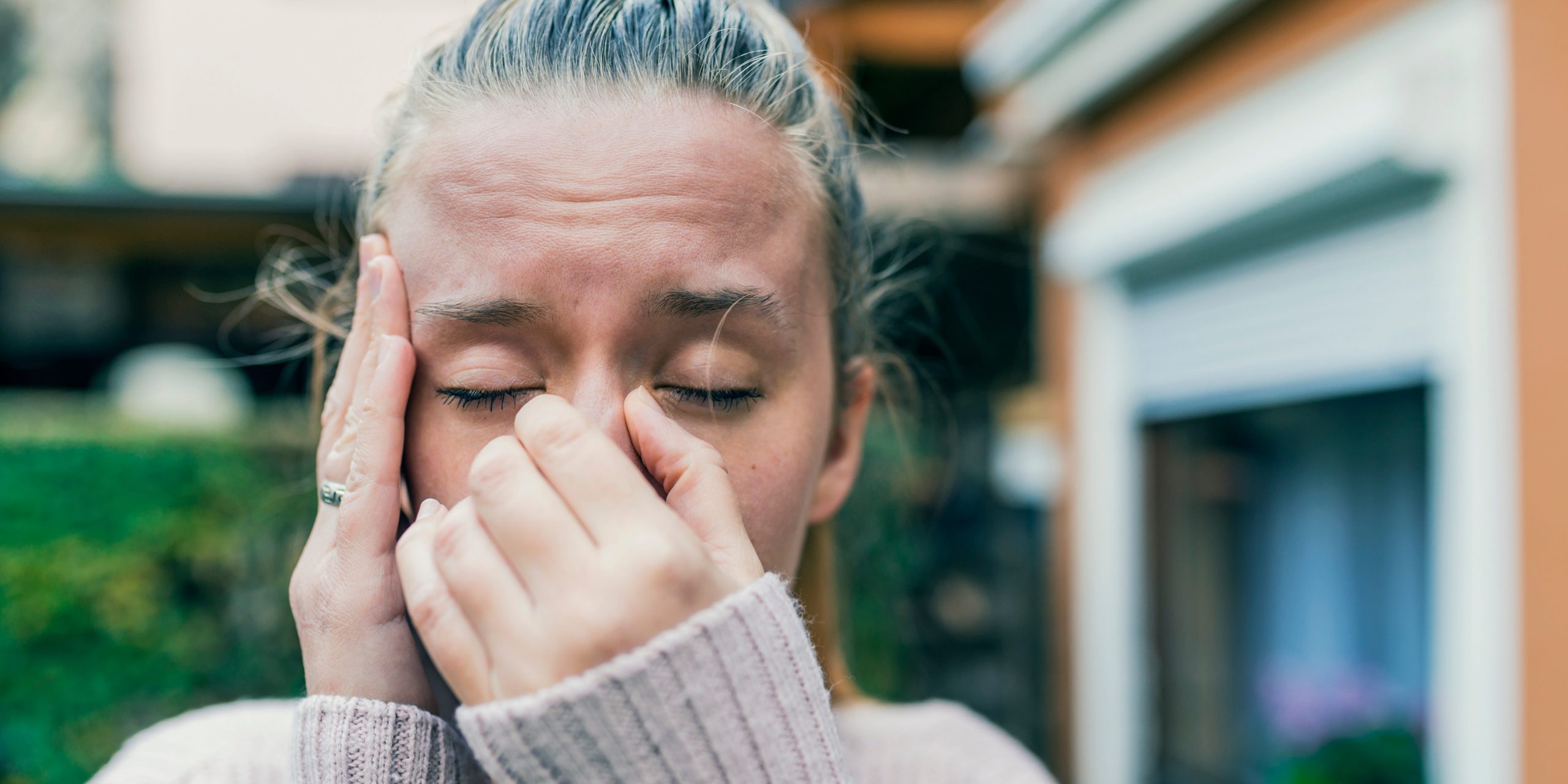The common cold affects millions of Americans each year. It can strike at any time, but most people get sick during the winter and spring.
There are over 200 viruses that can cause the common cold including coronaviruses and rhinoviruses. These viruses target the upper respiratory tract and trigger symptoms like cough, sore throat, runny nose, and sneezing.
A cold will usually resolve on its own without a doctor’s visit. There’s no vaccine against the viruses that cause the common cold, but there are steps you can take to speed up the recovery process and prevent future illness.
However, it’s important to make sure you have a cold and not something else, first. In this article we discuss the following:
Table of Contents
Symptoms
Symptoms will crop up 1-3 days after exposure. Then, the first several days of symptoms are often the most severe. You'll likely experience a mix of the following:
- Body Aches
- Congestion
- Coughing
- Headaches
- Loss of smell and taste
- Runny nose
- Sneezing
- Sore throat
Diagnosis
The common cold can feel much like other viral infections including the flu and COVID-19. That's because all of these illnesses affect the upper respiratory tract.
However, there are some ways to determine if what you have is a cold or allergies or something else.
Check your symptoms
The fastest way to diagnose your illness is to check out your symptoms. For example, fever is a common symptom for the flu and COVID-19 but not for a cold. See the list of distinguishing symptoms below:

Note the time of year
After you've confirmed your symptoms, the time of year may also be a helpful indicator.
- Colds are most common during the winter and spring months. You can also get a cold in the summer, but the symptoms are usually different.
- Flu season in the US usually starts in October and ends in February.
- Allergy season is most intense the first week of May, but people can get allergies through the spring, summer, and fall.
Track how long you've been sick
Finally, don't forget to track how long you've felt ill.
- The common cold typically lasts 7-10 days in adults and babies.
- The flu lasts about 7-14 days.
- Season allergies can last multiple weeks to months, or for as long as you're exposed to the offending allergen.
Treatment
If you've determined that you have something besides a cold, then seek the proper treatment whether it's getting your allergies under control or fighting the flu.
If it is a cold that's coming on, then there are a lot of remedies out there from which to choose. Some will help speed up your recovery. Others will only relieve symptoms. And a few aren't proven to help at all.
What works
Here are six common cold remedies that work:
1. Stay hydrated. Colds can dehydrate you and deplete you of important nutrients you need to fight the virus. Therefore, it's important to make sure you're drinking plenty of fluids.
Warm liquids - like broths and caffeine-free teas - have been shown to help ease symptoms, including a sore throat and runny nose, more than room-temperature liquids.
Avoid drinks that will dehydrate you like caffeinated and alcoholic beverages. Also cut out sugary drinks like soda, sports drinks, and juice. Juice may contain nutrients like vitamin C, which can help with a cold, but the excess sugar can counteract any benefits by farther dehydrating you.
Moreover, limited research in animals suggests that excess sugar may suppress the immune system, but more research is needed to determine how this could affect your recovery time.
2. Eat right. Instead of guzzling a gallon of orange juice, focus on eating foods that are rich in vitamin C, like the following:

Other foods to eat when you have a cold are those with nutrients that will boost the immune system and ramp up the healing process. These nutrients include vitamins A, E, B6, D, and minerals like zinc and iron. See below for foods rich in these nutrients:

3. Take a supplement. Being sick can sometimes make you lose your appetite. Therefore, a supplement may be in order. Focus on supplements that contain the immune-boosting vitamins and minerals you need.
Insider Reviews has a list of cold remedies, including helpful vitamin and mineral supplements.
4. Get enough sleep. When you're asleep, that's when your body is working its hardest to fight inflammation and infection. But it can be difficult to get the recommended amount if you're all clogged up.
Here are some tips for how to sleep with a stuffy nose:
- Sleep on your back and add an extra pillow to prop your head up so the mucus has a chance to drain while you're sleeping.
- Place a hot towel over your nose and forehead. The warmth will dilate the nasal passages and reduce the pressure from congestion as you drift off.
- Run a humidifier in your room. The moist air can loosen up the mucus that's causing congestion.
- Take an antihistamine or decongestant before bed.
5. Take over-the-counter medication. OTC medications, like antihistamines and decongestants, will relieve some discomfort, but they cannot help you recover any faster.
6. Try a neti pot. Humans have been using some version of a neti pot to ease nasal congestion for about 3,000 years. It may not help speed up your recovery, but it can relieve some symptoms.
When using a neti pot, it's extremely important to have sterile water. You can buy sterile water at the store, or you can sterilize tap water from your faucet by boiling it and letting it cool before use, or passing it through a CDC-approved filter.
What doesn't work
Unless instructed by your doctor, it's best to avoid the following:
Sweating it out. When you're sick with a cold, you're already losing fluids, and sweating will only accelerate that process. So, no, you can't sweat out a cold, and trying to do so will likely dehydrate you and make you feel worse than you already do.
Antibiotics. Antibiotics work when you have a bacterial infection, like strep throat or a urinary tract infection (UTI). Since the common cold is a viral infection, antibiotics cannot treat it. Moreover, when taken unnecessarily, antibiotics may weaken your immune system.
Antivirals. Yes, antivirals work to help treat viral infections. However, there are no current antiviral medications specifically for the common cold. There are a couple drugs, like Tamiflu, that can help with the flu.
Herbal remedies. Small, preliminary studies suggest that herbal remedies like elderberry, garlic, and ginseng may relieve symptoms and speed up recovery. However, more research is needed to definitively determine these benefits for the general population.
Risk Factors
The average, healthy adult should recover from the common cold without a doctor's visit.
However, the cold is a viral infection and sometimes the virus can grow out of control. That's when you'll experience more severe symptoms like:
- Difficulty breathing
- Wheezing
- Rapid breathing
- High fever above 101.3 degrees Fahrenheit
- High fever for more than 4 days
- Worsening cough, sore throat, or headache
- Worsening symptoms beyond day 10 of the start of your illness
If you experience these symptoms, it's critical that you seek medical aid immediately.
Anyone may experience severe complications from the common cold, but the groups who are most at risk of worsening symptoms are:
- Infants and children younger than 6 years old
- Elderly, ages 65 and up
- People who are immunocompromised
- Chronic smokers
Prevention
The common cold is a contagious disease. It's usually transmitted through viral-infected mucus droplets in the air, like when someone sneezes. In fact, virus-teeming droplets from a sneeze can travel up to 26 feet.
Learn more about how contagious a single sneeze is in the video below.
You may also contract a cold virus by touching an infected surface and then your face before washing your hands. It depends on the surface, but viruses can live for hours to multiple days on a specific surface.
Therefore, the best way to prevent colds - especially at the height of cold season - is to:
- Wash your hands or use hand sanitizer in a pinch
- Disinfect your home
- Disinfect your clothes
- Don't wear shoes in the house
- Clean your toothbrush, especially if you have roommates who might be sick
There are also lifestyle changes you can make to build up your body's defense systems. Eating right, getting enough sleep, and regular exercise can help keep your immune system healthy, making it easier for you to fend off infections when you're exposed in the future.
Takeaways
Adults get 2-3 colds a year. You'll likely be bed-ridden and away from work, family, and friends for a solid week.
But if you take care of yourself, request the necessary time off, and get enough sleep and nutrition, you may start to feel better even sooner than you expect.
